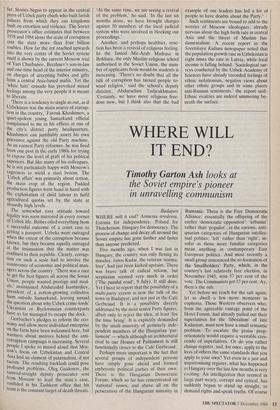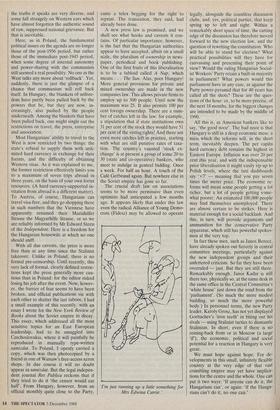WHERE WILL IT END?
Timothy Garton Ash looks at
the Soviet empire's pioneer in unravelling communism
Budapest WHERE will it end? Armenia irredenta. Estonia for independence. Poland for Thatcherism. Hungary for democracy. The process of change and decay all around the Soviet empire has gone farther and faster than anyone predicted. Five months ago, when I was last in Hungary, the country was only flexing its muscles. Janos Kadar, the veteran 'norma- lise?, had just been kicked upstairs. There was brave talk of radical reform, but scepticism seemed very much in order (`The painful road', 9 July). It still does. Yet I have to report that the possibility of a multi-party system is now the talk of the town in Budapest; and not just in the Café Gerbeaud. It is a possibility directly addressed by the most senior Party figures, albeit only to reject the idea, at least 'for the time being'. It is explicitly demanded by the small minority of genuinely inde- pendent members of the Hungarian 'par- liament' — which although an architectural rival to our Houses of Parliament is still functionally closer to the Café Gerbeaud.
Perhaps more important is the fact that several groups of independent persons have simply gone ahead and formed embryonic political parties of their own. There is the Hungarian Democratic Forum, which so far has concentrated on 'national' issues, and above all on the persecution of the Hungarian minority in
Rumania. There is the Free Democratic Alliance, essentially the offspring of the earlier 'democratic opposition': 'urbanist' rather than 'populist', in the curious, anti- quarian categories of Hungarian intellec- tual politics; 'left' rather than 'right', in- sofar as those more familiar categories mean anything in contemporary East European politics. And most recently a small group announced the re-formation of the Smallholders' Party, which, in the country's last relatively free election, in November 1945, won 57 per cent of the vote. The Communists got 17 per cent. Ay, there's the rub.
Yet before we reach for the salt again, let us dwell a few more moments in euphoria. Those Western observers who, from the agreeable vantage point of the Hotel Forum, had already pulled out their superlatives for the 'liberalism' of late Kadarism, must now have a small semantic problem. To escalate the praise prop- ortionately would require a veritable cres- cendo of superlatives. Or do you rather change register, and, for once, apply to the lives of others the same standards that you apply to your own? Yet even in a just and unpatronising register, what has happened in Hungary over the last few months is very exciting. An intelligentsia that seemed in large part weary, corrupt and cynical, has suddenly begun to stand up straight, to demand rights and speak truths. Of course
the truths it speaks are very diverse, and some fall strangely on Western ears which have almost forgotten the authentic sound of raw, suppressed national grievance. But that is inevitable.
Here, as in Poland, the fundamental political issues on the agenda are no longer those of the post-1956 period, but rather those of the immediate post-1945 period, when some degree of internal autonomy and power-sharing with the communists still seemed a real possibility. No one in the West talks any more about 'rollback'. Yet, suddenly, there is just the glimpse of a chance that communism will roll back itself. In Hungary, the blankets of unfree- dom have partly been pulled back by the powers that be, but they are now, in- creasingly, also pushed by the people underneath. Among the blankets that have been pulled back, one might single out the restrictions on travel, the press, enterprise and association.
Most Hungarians' ability to travel to the West is now restricted by two things: the state's refusal to supply them with unli- mited hard currency in exchange for their forints, and the difficulty of obtaining Western visas. As it was explained to me, the former restriction effectively limits you to a maximum of seven trips abroad in three years, on the basis of your own forint resources. (A hard currency-supported in- vitation from abroad is a different matter). To Austria, of course, Hungarians can travel visa-free, and they go shopping there in such numbers that the Viennese have apparently renamed their Mariahilfer Strasse the Magyarhilfe Strasse, or so we are reliably informed by Mr Edward Steen of the Independent. Here is a freedom for the Hungarian housewife at which no one should sniff.
With all due caveats, the press is more free than at any time since the Stalinist takeover. Unlike in Poland, there is no formal pre-censorship. Until recently, this very lack of formal, clearly defined restric- tions kept the press generally more cau- tious than in Poland: for the editor risked losing his job after the event. Now, howev- er, the barrier of fear seems to have been broken, and official publications vie with each other to shatter the last taboos. I had a small example of this recently, with an essay I wrote for the New York Review of Books about the Soviet empire in decay. This essay, which addressed all the most sensitive topics for an East European leadership, had to be smuggled into Czechoslovakia, where it will painfully be reproduced in manually type-written samizdat. To Poland, I openly carried a copy, which was then photocopied by a friend in one of Warsaw's free-access xerox shops. In due course it will no doubt appear in sarnizdat. But the legal indepen- dent journal Res Pubflea reckons that if they tried to do it 'the censor would eat half. From Hungary, however, from an official monthly quite close to the Party, came a telex begging for the right to reprint. The translation, they said, had already been done.
A new press law is promised, and we shall see what hooks and caveats it con- tains. Of particular importance, however, is the fact that the Hungarian authorities appear to have accepted, albeit on a small scale, the pluralism of ownership in news- paper, periodical and book publishing. One of the first fruits of this liberalisation is to be a tabloid called A Nap, which means . . . The Sun. Alas, poor Hungary! More general provisions for private and mixed ownership are made in the new companies law. This allows private firms to employ up to 500 people. Until now the maximum was 25. It also permits 100 per cent foreign ownership. There are a num- ber of catches left in the law: for example, a stipulation that if state institutions own 31 per cent of the stock they would have 51 per cent of the voting rights! And there are even more catches left in practice, starting with what are still punitive rates of taxa- tion. The country's vaunted 'stock ex- change' is at present a group of some 20 to 30 (state and co-operative) bankers, who meet to indulge in genteel bidding. Once a week. For half an hour. A touch of the Café Gerbeaud again. But nowhere else in the Soviet empire has gone so far.
The crucial draft law on associations seems to be more permissive than even optimists had anticipated a few months ago. It appears likely that under this law even the radical Alliance of Young Demo- crats (Fidesz) may be allowed to operate I'm just running up a little something fo Mrs Edwina Currie.' legally, alongside the countless discussion clubs, and, yes, political parties, that keep spring up to left and right. Within a remarkably short space of time, the cutting edge of the discussion has therefore moved forward to the new election law, and the question of rewriting the constitution. Who will be able to stand for election? What practical possibilities will they have for canvassing and presenting their point of view? Would the ruling Hungarian Social- ist Workers' Party retain a built-in majority in parliament? What powers would this parliament have in any case, as against the Party power-pyramid that for 40 years has called all the shots? These are the ques- tions of the hour: or, to be more precise, of the next 18 months, for the biggest changes are intended to be made by the middle of 1990.
All this is, as American bankers like to say, 'the good nooz'. The bad nooz is that Hungary is still in a deep economic mess: a mess which the reforms will, in the short term, inevitably deepen. The per capita hard currency debt remains the highest in Eastern Europe. Inflation was over 20 per cent This year, and with the indispensable price liberalisation it might easily rip up to Polish levels, where the taxi dashboards say 'x7' — meaning that you pay seven times the meter price. The economic re- forms will mean some people getting a lot richer, but a lot of people getting some- what poorer. An estimated 100,000 people may find themselves unemployed. There are almost certain to be strikes. Here is material enough for a social backlash. And this, in turn, will provide arguments and ammunition for the conservative Party apparatus, which still has powerful spokes- men at the very top.
In fact these men, such as Janos Berecz, have already spoken out fiercely in central committee meetings, particularly against the new independent groups and their unfettered criticism. So far they have been overruled — just. But they are still there. Remarkably enough, Janos Kadar is still there too, physically so, at the same desk in the same office in the Central Committee's 'white house' just down the road from the 'parliament'. (So much the more modest building, so much the more powerful body.) In personnel terms, the new Party leader, Karoly Grosz, has not yet displayed Gorbachev's 'iron teeth' in biting out his rivals — using Stalinist tactics to dismantle Stalinism. In short, even if there is no reining-back from or in Moscow (a large 'if), the economic, political and social potential for a reaction in Hungary is very great.
We must hope against hope. For de- velopments in this small, infinitely flexible country at the very edge of that vast crumbling empire may yet have implica- tions for the centre and the whole. One can put it two ways: 'If anyone can do it, the Hungarians can', or again: 'if the Hunga- rians can't do it, no one can.'



































































 Previous page
Previous page